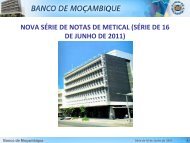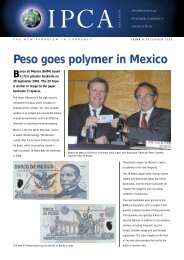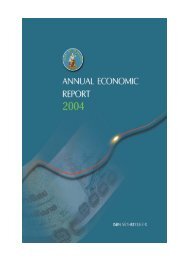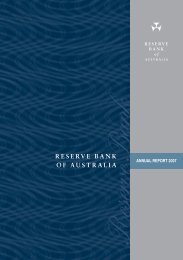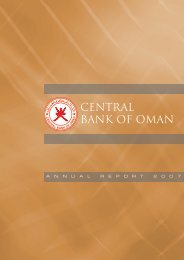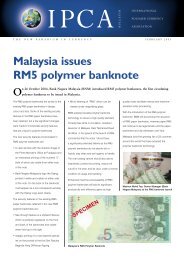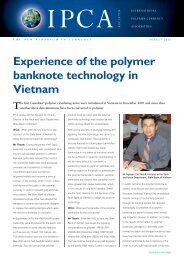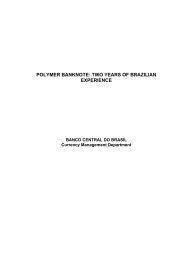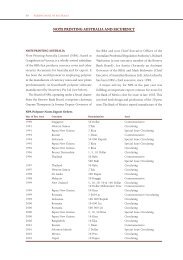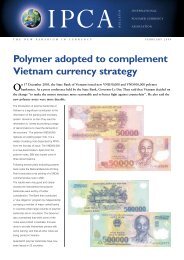ANNUAL REPORT 2008 - Polymer Bank Notes of the World
ANNUAL REPORT 2008 - Polymer Bank Notes of the World
ANNUAL REPORT 2008 - Polymer Bank Notes of the World
Create successful ePaper yourself
Turn your PDF publications into a flip-book with our unique Google optimized e-Paper software.
With regard to merger and acquisition (M&A)activity, <strong>the</strong> total number <strong>of</strong> transactionsdeclined in 2007. However, a significantincrease was recorded in <strong>the</strong> number <strong>of</strong>acquisitions by EU credit institutions <strong>of</strong> bankslocated in countries outside <strong>the</strong> EU, which haveexceeded <strong>the</strong> figures for domestic deals over <strong>the</strong>past three years. The value <strong>of</strong> M&As has beengrowing since 2003, with 2007 being <strong>the</strong> secondconsecutive year in which <strong>the</strong> total value <strong>of</strong>M&A transactions exceeded <strong>the</strong> peak recordedin 2000. Concentration increased, reflecting, on<strong>the</strong> one hand, continuing market consolidationand, on <strong>the</strong> o<strong>the</strong>r hand, <strong>the</strong> dynamic growth <strong>of</strong>certain banking groups, partly as a result <strong>of</strong> <strong>the</strong>irM&A activity. It should be noted that smallercountries tend to have more concentratedbanking sectors, with <strong>the</strong> notable exceptions <strong>of</strong>Austria and Luxembourg, <strong>the</strong> former having astrong savings and cooperative banking sector,and <strong>the</strong> latter hosting a large number <strong>of</strong> foreigncredit institutions.Finally, banking intermediation was streng<strong>the</strong>ned,as evidenced by <strong>the</strong> fact that <strong>the</strong> total assets <strong>of</strong>credit institutions grew at a higher rate thanGDP. However, <strong>the</strong> growth <strong>of</strong> total assets(10.7%) in 2007 at <strong>the</strong> EU level decelerated incomparison with previous years (2005: 13.7%;2006: 11.9%). 3 It should be noted that thisaggregate figure conceals strong fluctuations: <strong>the</strong>newer Member States experienced above averagegrowth <strong>of</strong> nearly 25% in nominal terms, while<strong>the</strong> United Kingdom, whose financial sectoraccounts for approximately a quarter <strong>of</strong> <strong>the</strong> EUbanking sector’s assets, reported only a 2.3%increase in total assets. With <strong>the</strong> structuralchanges in <strong>the</strong> financial system and <strong>the</strong> declinein investment funds and hedge funds, corecommercial banks will become more central tocredit intermediation.1.2 FINANCIAL STABILITY ARRANGEMENTSInitiatives were launched both internationallyand in <strong>the</strong> EU to address <strong>the</strong> weaknesses <strong>of</strong> <strong>the</strong>overall financial stability framework revealedby <strong>the</strong> financial turmoil.In April <strong>2008</strong> <strong>the</strong> Financial Stability Forum(FSF) proposed recommendations to enhancemarket and institutional resilience. In thiscontext, authorities are expected to clarifyand streng<strong>the</strong>n national and cross-borderarrangements for dealing with weak banks,as well as to review and, where necessary,streng<strong>the</strong>n deposit insurance arrangements.In terms <strong>of</strong> bank resolution arrangements andcross-border crisis management, <strong>the</strong> BaselCommittee on <strong>Bank</strong>ing Supervision (BCBS)carried out a review <strong>of</strong> national practices.Meanwhile, <strong>the</strong> FSF is developing a set<strong>of</strong> high-level principles for financial crisismanagement.In May <strong>2008</strong> <strong>the</strong> ECOFIN Council updated<strong>the</strong> EU roadmap on streng<strong>the</strong>ning financialstability arrangements adopted in October2007. In accordance with this roadmap, <strong>the</strong>Memorandum <strong>of</strong> Understanding (MoU) oncross-border financial stability among EUsupervisory authorities, finance ministriesand central banks entered into force on1 June <strong>2008</strong>. 4 The BSC – through a dedicatedtask force – has been assisting <strong>the</strong> relevantauthorities in <strong>the</strong> implementation <strong>of</strong> thisMoU, focusing on implementing <strong>the</strong> commonanalytical framework for assessing <strong>the</strong> systemicimplications <strong>of</strong> a financial crisis. In addition, <strong>the</strong>BSC has reviewed <strong>the</strong> key crisis managementfunctions currently in place in <strong>the</strong> MemberStates, providing input on initiatives to review<strong>the</strong> tools at <strong>the</strong> authorities’ disposal.In October <strong>2008</strong> EU Member States took anumber <strong>of</strong> initiatives to ensure that <strong>the</strong> design<strong>of</strong> national stabilisation measures to resolve<strong>the</strong> financial turmoil does not lead to negative3 It should be noted that this analysis is based on stockon-balance-sheet data. The analysis <strong>of</strong> trends with regard tototal assets would be improved by <strong>the</strong> availability <strong>of</strong> flow dataon securitised assets (both publicly and privately placed). Thelack <strong>of</strong> data on securitised assets has less <strong>of</strong> an impact on <strong>the</strong>analysis for <strong>the</strong> countries that have joined <strong>the</strong> EU since 2004,where asset securitisation is not so developed. In addition, fornon-euro area countries, figures are not exchange rate-adjusted,so developments could be partially influenced by changes in <strong>the</strong>exchange rate between local currencies and <strong>the</strong> euro.4 http://www.ecb.europa.eu/pub/pdf/o<strong>the</strong>r/mou-financialstability<strong>2008</strong>en.pdf152 ECBAnnual Report<strong>2008</strong>


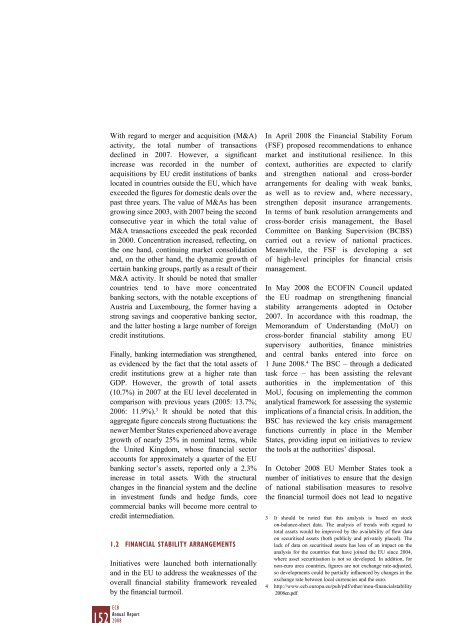
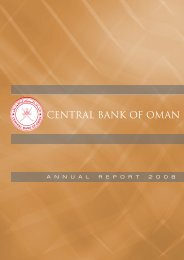
![KNOW YOUR NEW GIBRALTAR BANKNOTES - [Home] bThe/b](https://img.yumpu.com/50890985/1/184x260/know-your-new-gibraltar-banknotes-home-bthe-b.jpg?quality=85)
![PAPUA NEW GUINEA - [Home] - Polymer Bank Notes of the World](https://img.yumpu.com/49758743/1/190x143/papua-new-guinea-home-polymer-bank-notes-of-the-world.jpg?quality=85)

